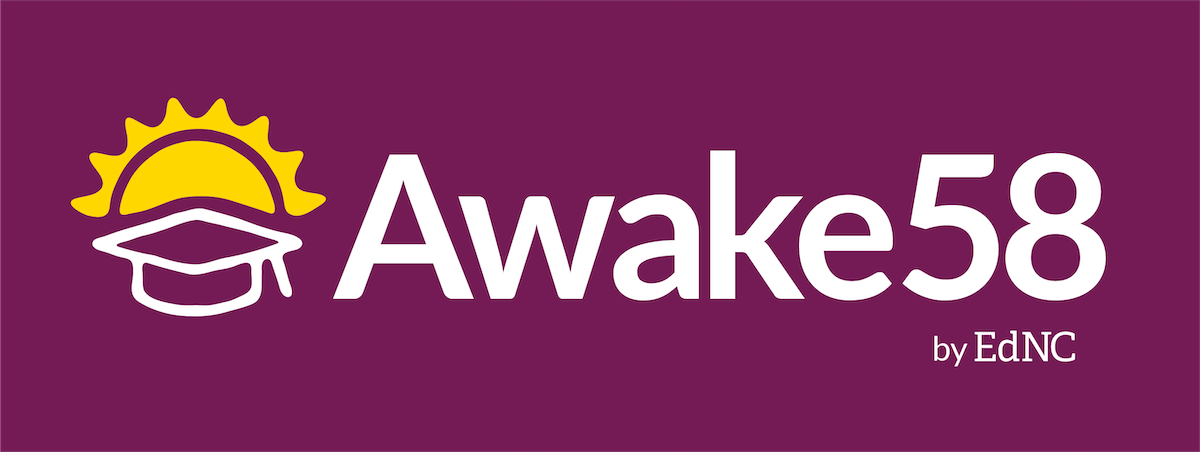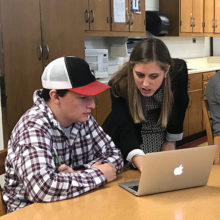A note from us
Welcome to the latest edition of Awake58. We hope you will stay a while. If you received this email without a subscription, please click here to subscribe to this newsletter.
New report looks at how North Carolina could design a statewide community college promise program… The State Board of Community Colleges met in person last week… We want to know what stories we should be telling this year…
Good morning everyone,
This is Molly, EdNC’s news and policy director, taking over for Nation again this week as he is off this month. Thanks for taking the time to read today!
As of November 2020, 19 North Carolina community colleges had some form of local promise program that gives scholarships to eligible students in their service areas. A group of Master’s in Public Policy candidates at Duke’s Sanford School of Public Policy examined how North Carolina could create a statewide community college promise program that would increase postsecondary attainment, maximize access and equity, and be cost-effective. Last week, we published that report.
The students researched national best practices, conducted case studies of three states with statewide promise programs (Tennessee, Delaware, and Oregon), and interviewed administrators at NC community colleges with local promise programs. They focused on three main design elements — funding structure, eligibility requirements, and persistence requirements — and gave recommendations for each.
For example, they recommend that North Carolina establish a middle-dollar funding scheme. “In addition to last-dollar coverage, which would ideally apply to students’ tuition, fees, and supply costs,” the report reads, “this would include a set amount each year that can be disbursed for additional expenses (e.g., rent) through a need-based application process.”
Read the full report and see the rest of their recommendations here.
The State Board of Community Colleges met in person last week for the first time since January 2020. The Board welcomed five new members, approved new performance measures and a new articulation agreement between the UNC System and NCCCS for teacher preparation programs, reviewed audit findings, and allocated funding to community colleges as part of the Longleaf Commitment and Longleaf Complete grants. Read more on the meeting here.
More colleges are announcing free tuition for eligible students this fall, using a combination of federal, state, and local funding. Is your college doing something similar? If so, email me at [email protected] and let me know!
Liz Bell, EdNC’s early childhood reporter, published a piece last week on the start of the new child tax credit payments. From July 15 through December 15, most families with children 17 years old and younger will receive monthly cash transfers. Read more on how much a family can receive and who is eligible in Liz’s piece, and please share with your colleagues, friends, and students who have children.
Finally, thank you to everyone who took our short, two-question survey last week about what EdNC should be covering over the next year. If you haven’t taken it yet, we want to hear from you.
What stories have we not told? What issues or topics do you want more information on? Is your college doing something especially unique and impactful? We want to hear about it.
Thank you for reading,
Molly
EdNC’s news and policy director
EdNC reads
Unlocking the promise of promise programs: Designing a statewide promise program for North Carolina’s community colleges
Community college promise programs have been shown to increase postsecondary attainment. Several North Carolina community colleges have local promise programs that offer free tuition, books, and fees, but unlike states like neighboring Tennessee, we do not have a statewide promise program.
What would a statewide promise program need to look like if it were to increase postsecondary attainment, maximize access and equity, and be cost-effective? A team of Duke public policy masters students recommends the following:
- Adopt a middle-dollar funding scheme for students’ tuition, fees, and supply costs, with available funds for students’ additional expenses combined with a Free Application for Federal Student Aid (FAFSA) requirement.
- Avoid eligibility requirements, particularly merit-based criteria.
- Incorporate proven persistence requirements of an annual credit and cumulative GPA minimum, paired with mandatory support services for students struggling with college academic requirements.
State Board of Community Colleges | Teacher preparation articulation agreement, performance measures, and more
In her last Board meeting as president of the North Carolina Association of Community College Presidents, Kandi Deitemeyer, president of Central Piedmont Community College, looked back to her first meeting last August.
“I said the word for the year would be grace,” she said.
Deitemeyer praised the efforts of community college presidents, faculty, staff, and students over the last year and called attention to faculty and staff salaries.
“We must receive a minimum of 5%,” she said.
In his remarks to the Board, system president Thomas Stith also stressed the need for a minimum of a 5% salary increase for faculty and staff. He also spoke to the importance of working together as a system and as a Board.
“I believe in the integrity of our community colleges,” Stith said. “We are stronger when we work together as a system. We certainly have our unique initiatives and unique programs at each college. But if we are not unified, if we’re not working together as a 58-college system, working together as a Board, we will not be as strong.”
The Board welcomed five new members appointed by Gov. Roy Cooper: Sam Searcy of Holly Springs, Dr. Shirley Carraway of Winterville, Raymond Trapp of Durham, J. Anthony “Andy” Penry of Raleigh, and Sarah West of Chapel Hill. Each will serve a six-year term.
The Board also reported that the system experienced a $20 million tuition shortfall this year.
“While we did end up with a shortfall,” said Lisa Estep, vice chair of the finance committee, “this is a pretty amazing recovery. In February, we had probably one of the worst months that I can remember.”
Child tax credit payments have started. Here’s what you need to know.
From EdNC’s early childhood reporter, Liz Bell:
“Monthly cash transfers to most families with children 17 years old and younger have begun and will run from July 15 through Dec. 15.
“The child tax credit was expanded by the American Rescue Plan, a federal law enacted in March, to reach more families and send payments monthly.
“Families will receive totals of up to $3,000 for each child between 6 and 17 years old and $3,600 for each child under 6 years old. That means eligible families can expect to receive $250 per month for each child 6-17 years old and $300 per month for each child under 6 years old.
“Families are eligible to receive the full amounts per child listed above if their incomes are less than $75,000 for households with a single filer, $112,500 for head-of-household filers, and $150,000 for married couples jointly filing.”
We want to hear from you
At EdNC, we rely on feedback from our readers to let us know what we should be covering. What issues, topics, or stories are most important to you? What do you want to see more of from our community college coverage? What stories have we not told?
Please take this short two-question survey and let us know what you want to see from EdNC’s community college coverage over the next year. You can also email me directly at [email protected]. We look forward to hearing from you!
Around NC
The Belk Center for Community College Leadership & Research at NC State University has announced the 2021 Dallas Herring Lecture on Tuesday, November 16th at 1:00 pm ET. This year’s speaker will be Gregory Haile, J.D., President of Broward College in Florida. The title of his lecture is “Redefining Access: The Power of Proximity.” To register for this virtual event, click here.
The Carteret County News-Times featured a Carteret Community College summer camp where students learned to build a traditional Down East shove skiff. Read the story here.
Smart Asset released their annual community college rankings, and North Carolina community colleges held 8 of the top 10 spots. The report stated, “North Carolina dominates the top of this list for another year in a row, holding down the top six spots and eight of the top 10. All of them rank within approximately the top 10% for both low student-faculty ratio and high graduation and transfer rate, and they rank within the top 25% of the study for relatively low cost of tuition.”
The Fayetteville Observer highlights partnerships between four-year colleges and universities and community colleges in this piece, which features Fayetteville Tech, Bladen Community College, Central Carolina Community College, Robeson Community College, Sampson Community College, and Sandhills Community College.
Durham Tech is starting a new program this fall in agricultural biotechnology. The program is a partnership between Global Agricultural Development Corp., Durham Tech, and North Carolina State University. Find out more here.
This piece in the New Bern Sun Journal looks at how four-year and community colleges are providing tuition relief to students, including the Longleaf Commitment Grant for eligible 2021 high school graduates.
During the spring 2021 semester, Piedmont Community College partnered with the College Innovation Network (CIN), a program founded by WGU Labs, to study how well online communications platform Harmonize impacts student engagement. According to a press release, students and faculty report positive experiences using the platform.
This fall, Wake Tech is partnering with A Place at the Table to provide free six-to-eight week culinary and baking classes at the downtown Raleigh café. The courses will lead to industry certifications and will be offered Monday through Thursday in the evenings.
Other higher education reads
Sign up for Awake58, our newsletter on all things community college.

